BTEC Entrepreneurship and Small Business Management Report
VerifiedAdded on 2022/12/23
|14
|3824
|472
Report
AI Summary
This report delves into the realm of entrepreneurship and small business management, exploring diverse entrepreneurial ventures, their classification, and the similarities and differences among them. It analyzes the impact of micro and small businesses on the economy, supported by relevant data and statistics, highlighting their significance in employment and economic growth. The report further examines the role of small businesses and start-ups in fostering the social economy, emphasizing their contribution to innovation and job creation. Additionally, it identifies the characteristic traits and skills of successful entrepreneurs, differentiating them from general business managers, and assesses how personal background and experience can either facilitate or hinder entrepreneurial endeavors. The report provides a comprehensive overview of the entrepreneurial landscape, offering valuable insights into the dynamics of business creation and management.

Entrepreneur and Small
Business Management
Business Management
Paraphrase This Document
Need a fresh take? Get an instant paraphrase of this document with our AI Paraphraser
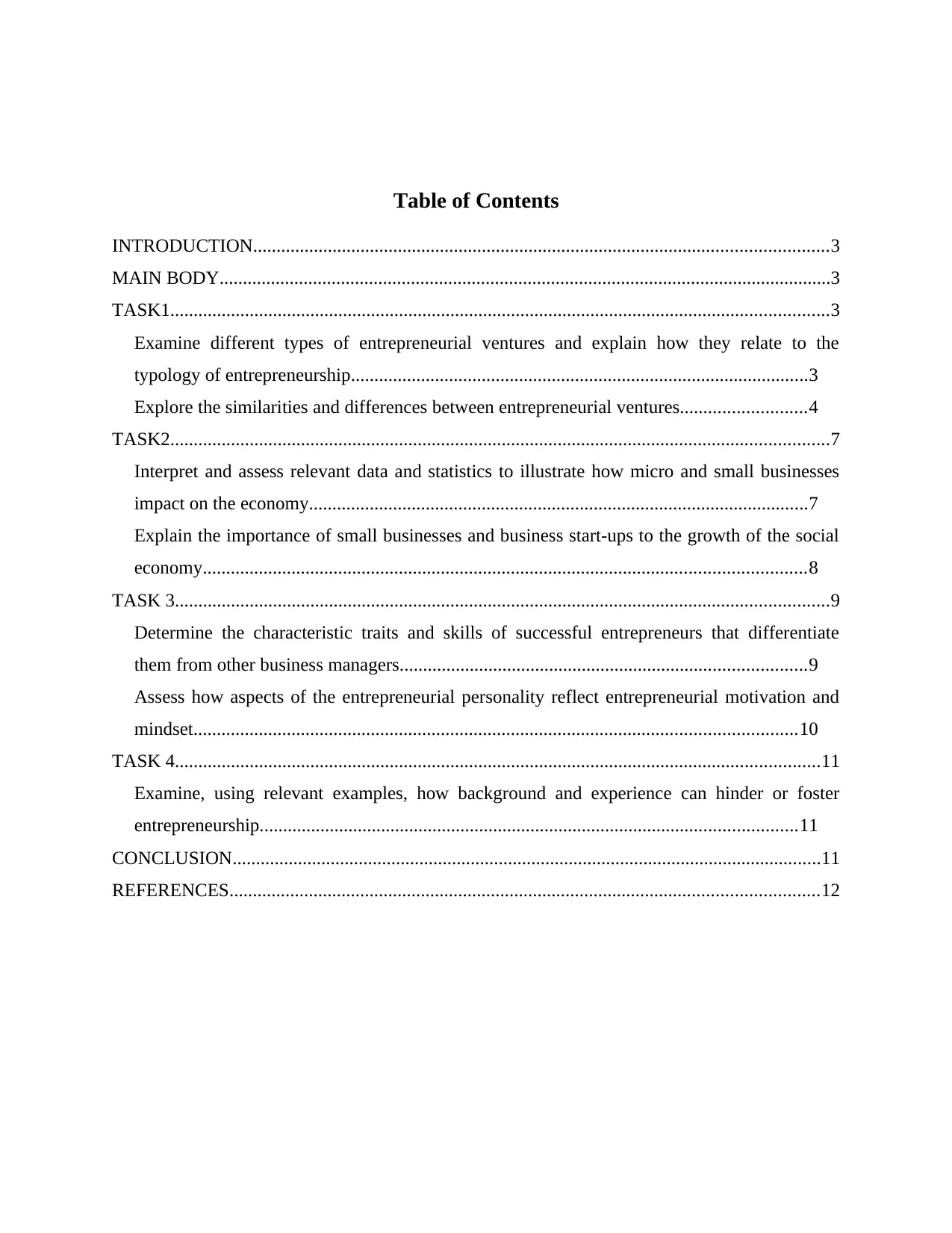
Table of Contents
INTRODUCTION...........................................................................................................................3
MAIN BODY...................................................................................................................................3
TASK1.............................................................................................................................................3
Examine different types of entrepreneurial ventures and explain how they relate to the
typology of entrepreneurship..................................................................................................3
Explore the similarities and differences between entrepreneurial ventures...........................4
TASK2.............................................................................................................................................7
Interpret and assess relevant data and statistics to illustrate how micro and small businesses
impact on the economy...........................................................................................................7
Explain the importance of small businesses and business start-ups to the growth of the social
economy.................................................................................................................................8
TASK 3............................................................................................................................................9
Determine the characteristic traits and skills of successful entrepreneurs that differentiate
them from other business managers.......................................................................................9
Assess how aspects of the entrepreneurial personality reflect entrepreneurial motivation and
mindset.................................................................................................................................10
TASK 4..........................................................................................................................................11
Examine, using relevant examples, how background and experience can hinder or foster
entrepreneurship...................................................................................................................11
CONCLUSION..............................................................................................................................11
REFERENCES..............................................................................................................................12
INTRODUCTION...........................................................................................................................3
MAIN BODY...................................................................................................................................3
TASK1.............................................................................................................................................3
Examine different types of entrepreneurial ventures and explain how they relate to the
typology of entrepreneurship..................................................................................................3
Explore the similarities and differences between entrepreneurial ventures...........................4
TASK2.............................................................................................................................................7
Interpret and assess relevant data and statistics to illustrate how micro and small businesses
impact on the economy...........................................................................................................7
Explain the importance of small businesses and business start-ups to the growth of the social
economy.................................................................................................................................8
TASK 3............................................................................................................................................9
Determine the characteristic traits and skills of successful entrepreneurs that differentiate
them from other business managers.......................................................................................9
Assess how aspects of the entrepreneurial personality reflect entrepreneurial motivation and
mindset.................................................................................................................................10
TASK 4..........................................................................................................................................11
Examine, using relevant examples, how background and experience can hinder or foster
entrepreneurship...................................................................................................................11
CONCLUSION..............................................................................................................................11
REFERENCES..............................................................................................................................12
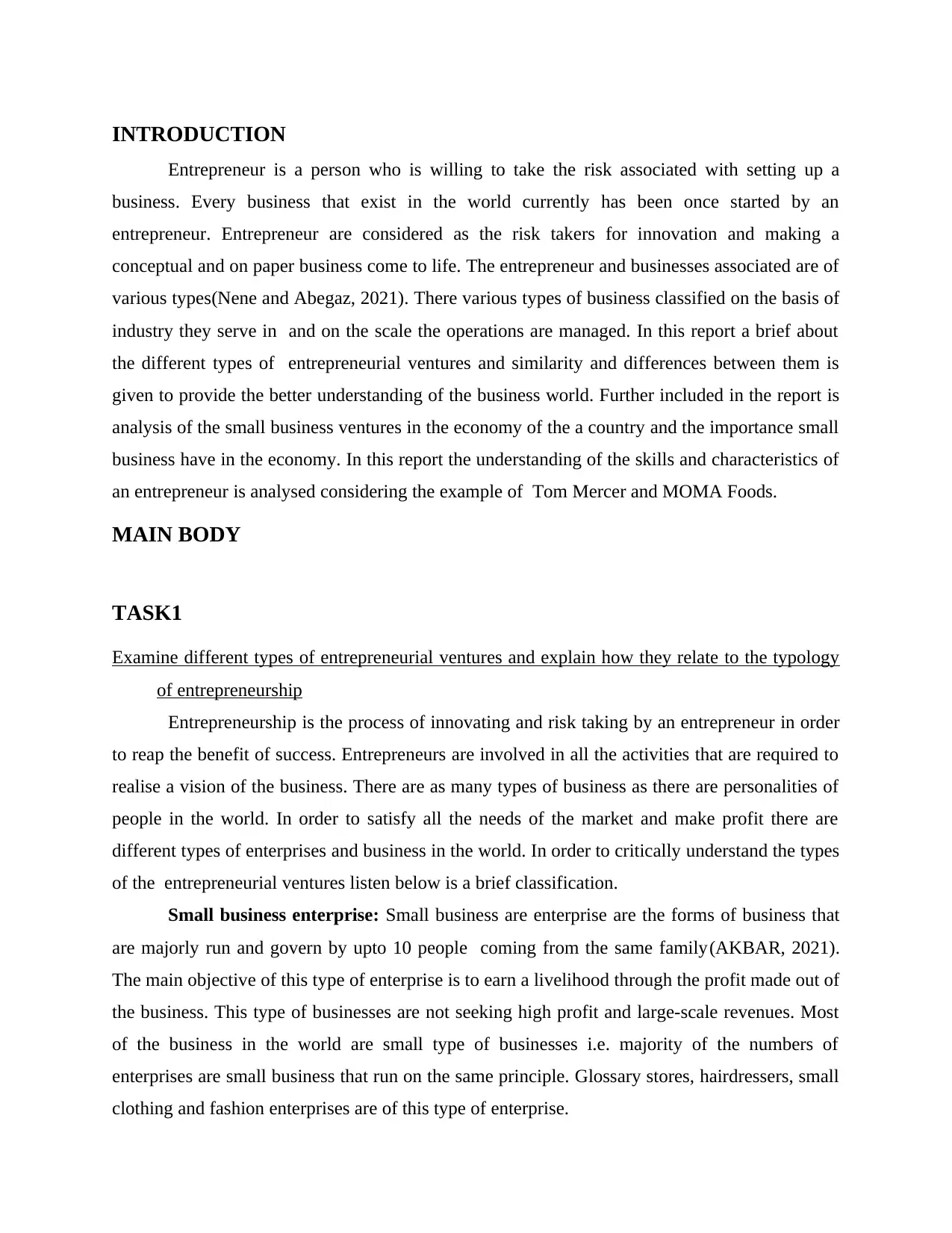
INTRODUCTION
Entrepreneur is a person who is willing to take the risk associated with setting up a
business. Every business that exist in the world currently has been once started by an
entrepreneur. Entrepreneur are considered as the risk takers for innovation and making a
conceptual and on paper business come to life. The entrepreneur and businesses associated are of
various types(Nene and Abegaz, 2021). There various types of business classified on the basis of
industry they serve in and on the scale the operations are managed. In this report a brief about
the different types of entrepreneurial ventures and similarity and differences between them is
given to provide the better understanding of the business world. Further included in the report is
analysis of the small business ventures in the economy of the a country and the importance small
business have in the economy. In this report the understanding of the skills and characteristics of
an entrepreneur is analysed considering the example of Tom Mercer and MOMA Foods.
MAIN BODY
TASK1
Examine different types of entrepreneurial ventures and explain how they relate to the typology
of entrepreneurship
Entrepreneurship is the process of innovating and risk taking by an entrepreneur in order
to reap the benefit of success. Entrepreneurs are involved in all the activities that are required to
realise a vision of the business. There are as many types of business as there are personalities of
people in the world. In order to satisfy all the needs of the market and make profit there are
different types of enterprises and business in the world. In order to critically understand the types
of the entrepreneurial ventures listen below is a brief classification.
Small business enterprise: Small business are enterprise are the forms of business that
are majorly run and govern by upto 10 people coming from the same family(AKBAR, 2021).
The main objective of this type of enterprise is to earn a livelihood through the profit made out of
the business. This type of businesses are not seeking high profit and large-scale revenues. Most
of the business in the world are small type of businesses i.e. majority of the numbers of
enterprises are small business that run on the same principle. Glossary stores, hairdressers, small
clothing and fashion enterprises are of this type of enterprise.
Entrepreneur is a person who is willing to take the risk associated with setting up a
business. Every business that exist in the world currently has been once started by an
entrepreneur. Entrepreneur are considered as the risk takers for innovation and making a
conceptual and on paper business come to life. The entrepreneur and businesses associated are of
various types(Nene and Abegaz, 2021). There various types of business classified on the basis of
industry they serve in and on the scale the operations are managed. In this report a brief about
the different types of entrepreneurial ventures and similarity and differences between them is
given to provide the better understanding of the business world. Further included in the report is
analysis of the small business ventures in the economy of the a country and the importance small
business have in the economy. In this report the understanding of the skills and characteristics of
an entrepreneur is analysed considering the example of Tom Mercer and MOMA Foods.
MAIN BODY
TASK1
Examine different types of entrepreneurial ventures and explain how they relate to the typology
of entrepreneurship
Entrepreneurship is the process of innovating and risk taking by an entrepreneur in order
to reap the benefit of success. Entrepreneurs are involved in all the activities that are required to
realise a vision of the business. There are as many types of business as there are personalities of
people in the world. In order to satisfy all the needs of the market and make profit there are
different types of enterprises and business in the world. In order to critically understand the types
of the entrepreneurial ventures listen below is a brief classification.
Small business enterprise: Small business are enterprise are the forms of business that
are majorly run and govern by upto 10 people coming from the same family(AKBAR, 2021).
The main objective of this type of enterprise is to earn a livelihood through the profit made out of
the business. This type of businesses are not seeking high profit and large-scale revenues. Most
of the business in the world are small type of businesses i.e. majority of the numbers of
enterprises are small business that run on the same principle. Glossary stores, hairdressers, small
clothing and fashion enterprises are of this type of enterprise.
⊘ This is a preview!⊘
Do you want full access?
Subscribe today to unlock all pages.

Trusted by 1+ million students worldwide
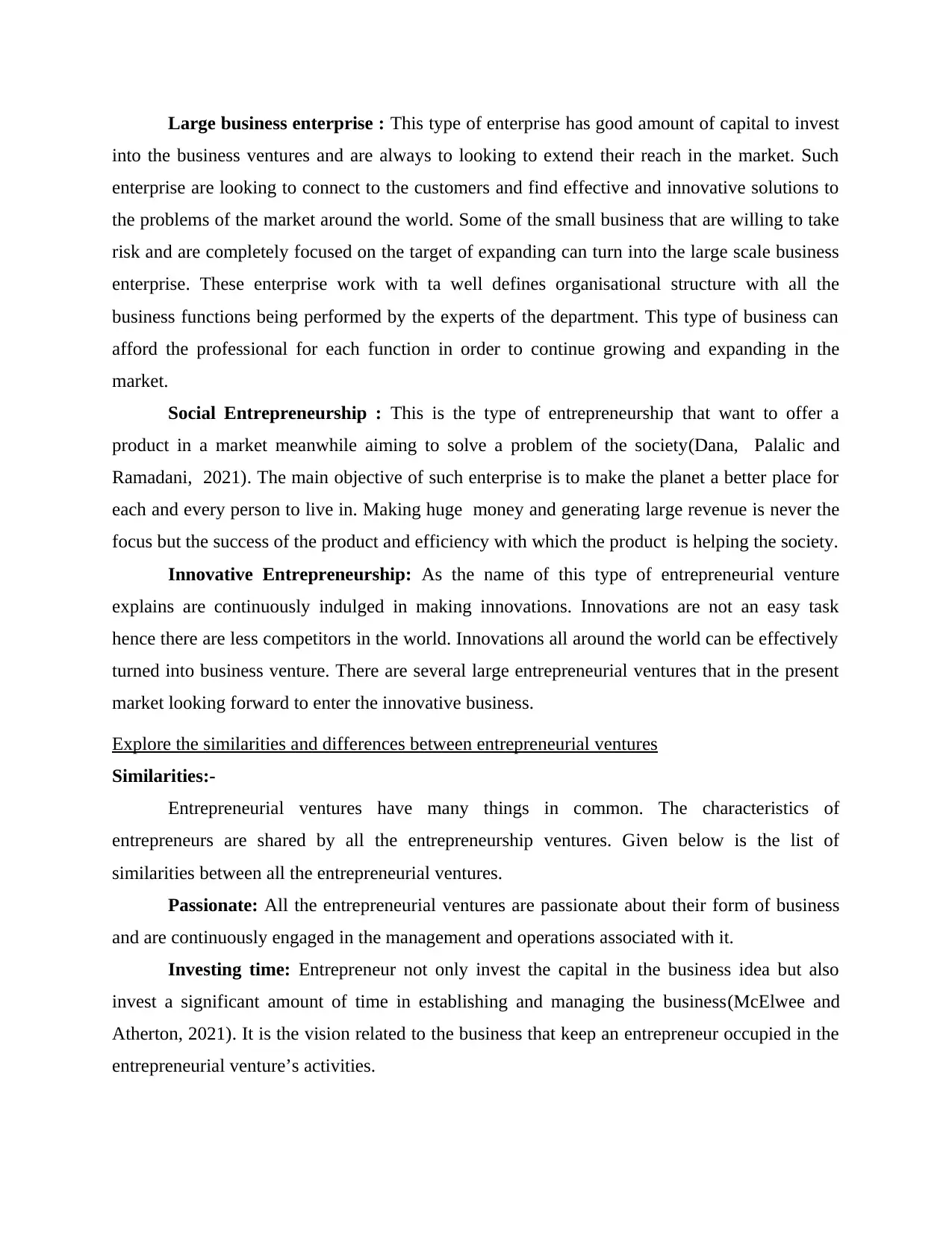
Large business enterprise : This type of enterprise has good amount of capital to invest
into the business ventures and are always to looking to extend their reach in the market. Such
enterprise are looking to connect to the customers and find effective and innovative solutions to
the problems of the market around the world. Some of the small business that are willing to take
risk and are completely focused on the target of expanding can turn into the large scale business
enterprise. These enterprise work with ta well defines organisational structure with all the
business functions being performed by the experts of the department. This type of business can
afford the professional for each function in order to continue growing and expanding in the
market.
Social Entrepreneurship : This is the type of entrepreneurship that want to offer a
product in a market meanwhile aiming to solve a problem of the society(Dana, Palalic and
Ramadani, 2021). The main objective of such enterprise is to make the planet a better place for
each and every person to live in. Making huge money and generating large revenue is never the
focus but the success of the product and efficiency with which the product is helping the society.
Innovative Entrepreneurship: As the name of this type of entrepreneurial venture
explains are continuously indulged in making innovations. Innovations are not an easy task
hence there are less competitors in the world. Innovations all around the world can be effectively
turned into business venture. There are several large entrepreneurial ventures that in the present
market looking forward to enter the innovative business.
Explore the similarities and differences between entrepreneurial ventures
Similarities:-
Entrepreneurial ventures have many things in common. The characteristics of
entrepreneurs are shared by all the entrepreneurship ventures. Given below is the list of
similarities between all the entrepreneurial ventures.
Passionate: All the entrepreneurial ventures are passionate about their form of business
and are continuously engaged in the management and operations associated with it.
Investing time: Entrepreneur not only invest the capital in the business idea but also
invest a significant amount of time in establishing and managing the business(McElwee and
Atherton, 2021). It is the vision related to the business that keep an entrepreneur occupied in the
entrepreneurial venture’s activities.
into the business ventures and are always to looking to extend their reach in the market. Such
enterprise are looking to connect to the customers and find effective and innovative solutions to
the problems of the market around the world. Some of the small business that are willing to take
risk and are completely focused on the target of expanding can turn into the large scale business
enterprise. These enterprise work with ta well defines organisational structure with all the
business functions being performed by the experts of the department. This type of business can
afford the professional for each function in order to continue growing and expanding in the
market.
Social Entrepreneurship : This is the type of entrepreneurship that want to offer a
product in a market meanwhile aiming to solve a problem of the society(Dana, Palalic and
Ramadani, 2021). The main objective of such enterprise is to make the planet a better place for
each and every person to live in. Making huge money and generating large revenue is never the
focus but the success of the product and efficiency with which the product is helping the society.
Innovative Entrepreneurship: As the name of this type of entrepreneurial venture
explains are continuously indulged in making innovations. Innovations are not an easy task
hence there are less competitors in the world. Innovations all around the world can be effectively
turned into business venture. There are several large entrepreneurial ventures that in the present
market looking forward to enter the innovative business.
Explore the similarities and differences between entrepreneurial ventures
Similarities:-
Entrepreneurial ventures have many things in common. The characteristics of
entrepreneurs are shared by all the entrepreneurship ventures. Given below is the list of
similarities between all the entrepreneurial ventures.
Passionate: All the entrepreneurial ventures are passionate about their form of business
and are continuously engaged in the management and operations associated with it.
Investing time: Entrepreneur not only invest the capital in the business idea but also
invest a significant amount of time in establishing and managing the business(McElwee and
Atherton, 2021). It is the vision related to the business that keep an entrepreneur occupied in the
entrepreneurial venture’s activities.
Paraphrase This Document
Need a fresh take? Get an instant paraphrase of this document with our AI Paraphraser
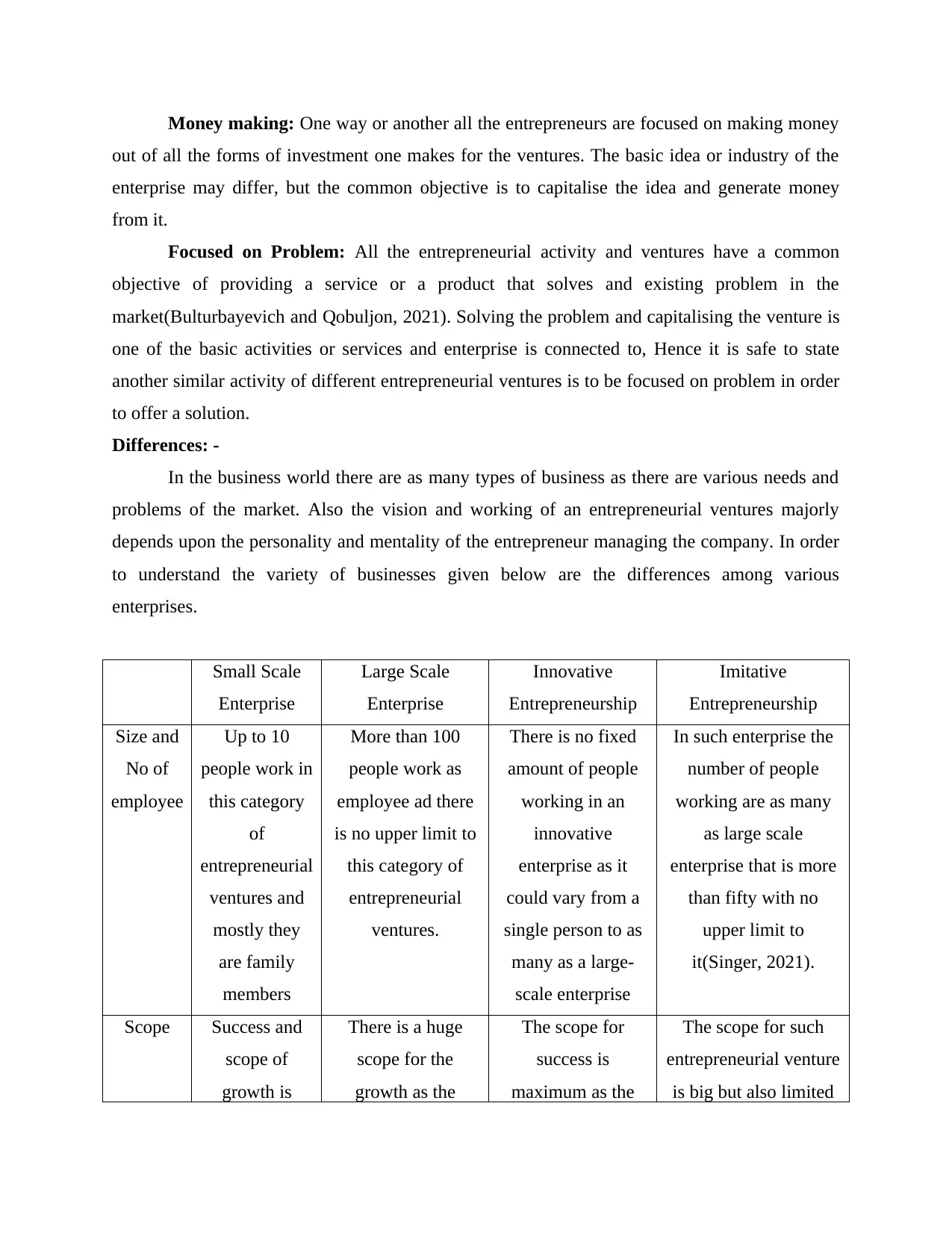
Money making: One way or another all the entrepreneurs are focused on making money
out of all the forms of investment one makes for the ventures. The basic idea or industry of the
enterprise may differ, but the common objective is to capitalise the idea and generate money
from it.
Focused on Problem: All the entrepreneurial activity and ventures have a common
objective of providing a service or a product that solves and existing problem in the
market(Bulturbayevich and Qobuljon, 2021). Solving the problem and capitalising the venture is
one of the basic activities or services and enterprise is connected to, Hence it is safe to state
another similar activity of different entrepreneurial ventures is to be focused on problem in order
to offer a solution.
Differences: -
In the business world there are as many types of business as there are various needs and
problems of the market. Also the vision and working of an entrepreneurial ventures majorly
depends upon the personality and mentality of the entrepreneur managing the company. In order
to understand the variety of businesses given below are the differences among various
enterprises.
Small Scale
Enterprise
Large Scale
Enterprise
Innovative
Entrepreneurship
Imitative
Entrepreneurship
Size and
No of
employee
Up to 10
people work in
this category
of
entrepreneurial
ventures and
mostly they
are family
members
More than 100
people work as
employee ad there
is no upper limit to
this category of
entrepreneurial
ventures.
There is no fixed
amount of people
working in an
innovative
enterprise as it
could vary from a
single person to as
many as a large-
scale enterprise
In such enterprise the
number of people
working are as many
as large scale
enterprise that is more
than fifty with no
upper limit to
it(Singer, 2021).
Scope Success and
scope of
growth is
There is a huge
scope for the
growth as the
The scope for
success is
maximum as the
The scope for such
entrepreneurial venture
is big but also limited
out of all the forms of investment one makes for the ventures. The basic idea or industry of the
enterprise may differ, but the common objective is to capitalise the idea and generate money
from it.
Focused on Problem: All the entrepreneurial activity and ventures have a common
objective of providing a service or a product that solves and existing problem in the
market(Bulturbayevich and Qobuljon, 2021). Solving the problem and capitalising the venture is
one of the basic activities or services and enterprise is connected to, Hence it is safe to state
another similar activity of different entrepreneurial ventures is to be focused on problem in order
to offer a solution.
Differences: -
In the business world there are as many types of business as there are various needs and
problems of the market. Also the vision and working of an entrepreneurial ventures majorly
depends upon the personality and mentality of the entrepreneur managing the company. In order
to understand the variety of businesses given below are the differences among various
enterprises.
Small Scale
Enterprise
Large Scale
Enterprise
Innovative
Entrepreneurship
Imitative
Entrepreneurship
Size and
No of
employee
Up to 10
people work in
this category
of
entrepreneurial
ventures and
mostly they
are family
members
More than 100
people work as
employee ad there
is no upper limit to
this category of
entrepreneurial
ventures.
There is no fixed
amount of people
working in an
innovative
enterprise as it
could vary from a
single person to as
many as a large-
scale enterprise
In such enterprise the
number of people
working are as many
as large scale
enterprise that is more
than fifty with no
upper limit to
it(Singer, 2021).
Scope Success and
scope of
growth is
There is a huge
scope for the
growth as the
The scope for
success is
maximum as the
The scope for such
entrepreneurial venture
is big but also limited
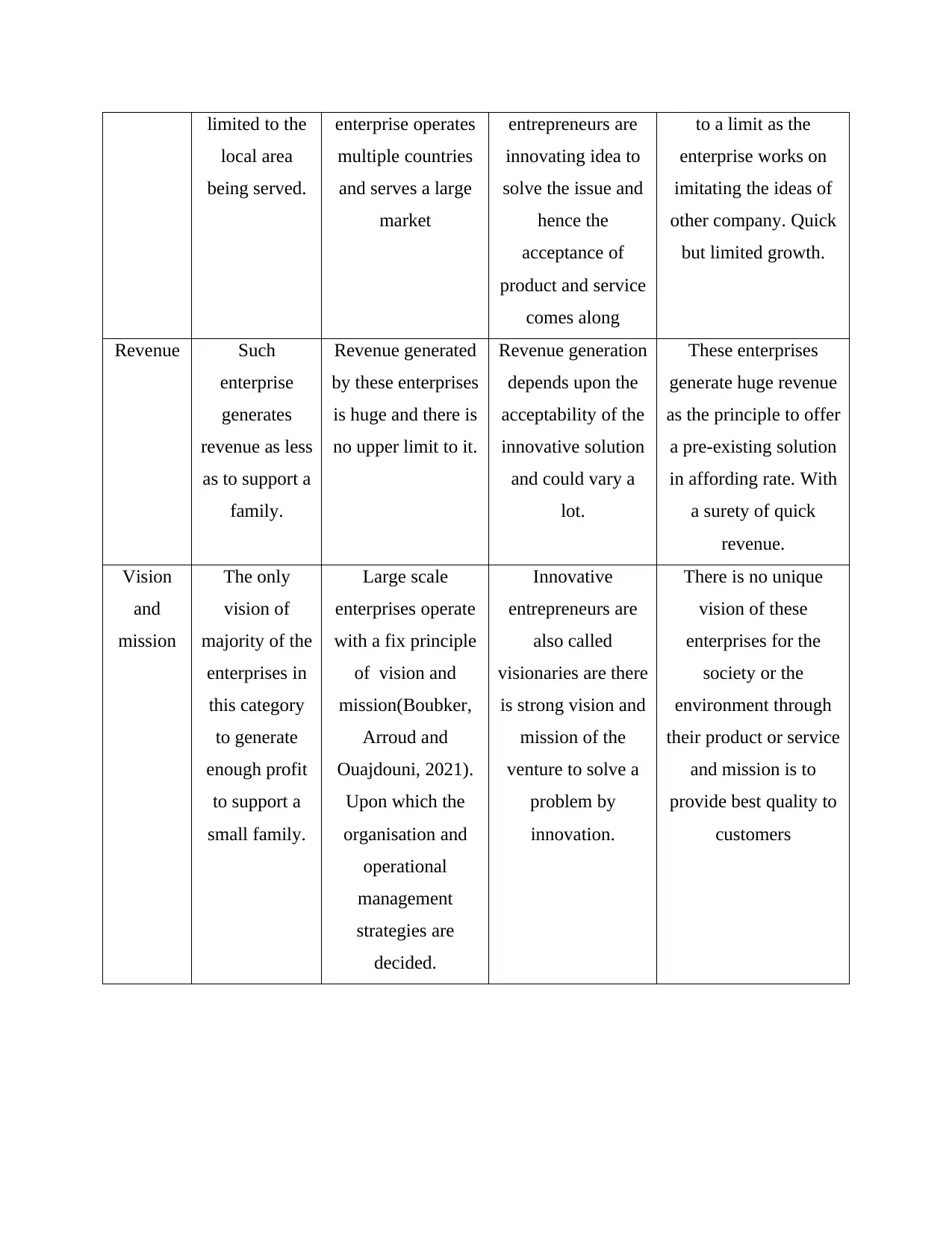
limited to the
local area
being served.
enterprise operates
multiple countries
and serves a large
market
entrepreneurs are
innovating idea to
solve the issue and
hence the
acceptance of
product and service
comes along
to a limit as the
enterprise works on
imitating the ideas of
other company. Quick
but limited growth.
Revenue Such
enterprise
generates
revenue as less
as to support a
family.
Revenue generated
by these enterprises
is huge and there is
no upper limit to it.
Revenue generation
depends upon the
acceptability of the
innovative solution
and could vary a
lot.
These enterprises
generate huge revenue
as the principle to offer
a pre-existing solution
in affording rate. With
a surety of quick
revenue.
Vision
and
mission
The only
vision of
majority of the
enterprises in
this category
to generate
enough profit
to support a
small family.
Large scale
enterprises operate
with a fix principle
of vision and
mission(Boubker,
Arroud and
Ouajdouni, 2021).
Upon which the
organisation and
operational
management
strategies are
decided.
Innovative
entrepreneurs are
also called
visionaries are there
is strong vision and
mission of the
venture to solve a
problem by
innovation.
There is no unique
vision of these
enterprises for the
society or the
environment through
their product or service
and mission is to
provide best quality to
customers
local area
being served.
enterprise operates
multiple countries
and serves a large
market
entrepreneurs are
innovating idea to
solve the issue and
hence the
acceptance of
product and service
comes along
to a limit as the
enterprise works on
imitating the ideas of
other company. Quick
but limited growth.
Revenue Such
enterprise
generates
revenue as less
as to support a
family.
Revenue generated
by these enterprises
is huge and there is
no upper limit to it.
Revenue generation
depends upon the
acceptability of the
innovative solution
and could vary a
lot.
These enterprises
generate huge revenue
as the principle to offer
a pre-existing solution
in affording rate. With
a surety of quick
revenue.
Vision
and
mission
The only
vision of
majority of the
enterprises in
this category
to generate
enough profit
to support a
small family.
Large scale
enterprises operate
with a fix principle
of vision and
mission(Boubker,
Arroud and
Ouajdouni, 2021).
Upon which the
organisation and
operational
management
strategies are
decided.
Innovative
entrepreneurs are
also called
visionaries are there
is strong vision and
mission of the
venture to solve a
problem by
innovation.
There is no unique
vision of these
enterprises for the
society or the
environment through
their product or service
and mission is to
provide best quality to
customers
⊘ This is a preview!⊘
Do you want full access?
Subscribe today to unlock all pages.

Trusted by 1+ million students worldwide
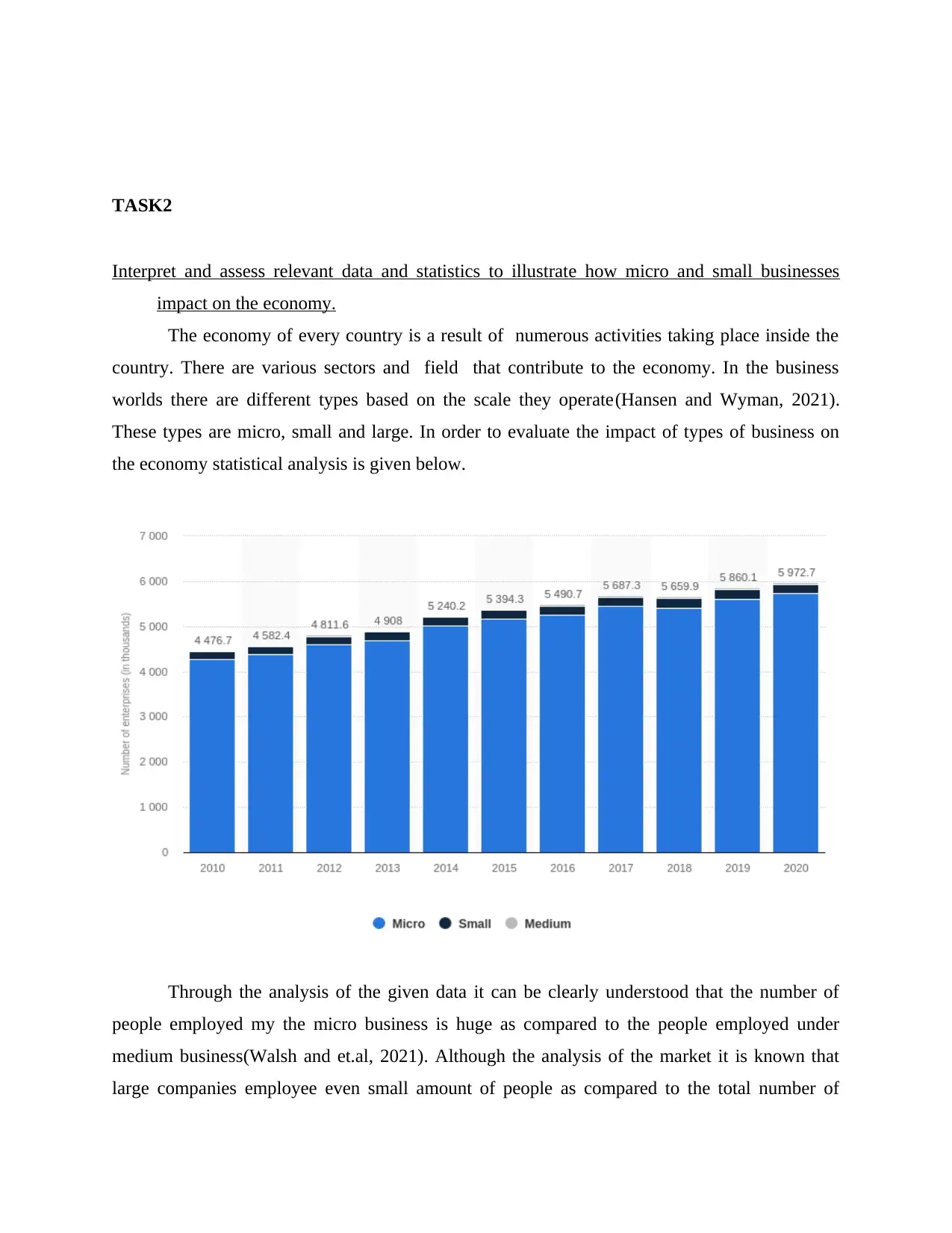
TASK2
Interpret and assess relevant data and statistics to illustrate how micro and small businesses
impact on the economy.
The economy of every country is a result of numerous activities taking place inside the
country. There are various sectors and field that contribute to the economy. In the business
worlds there are different types based on the scale they operate(Hansen and Wyman, 2021).
These types are micro, small and large. In order to evaluate the impact of types of business on
the economy statistical analysis is given below.
Through the analysis of the given data it can be clearly understood that the number of
people employed my the micro business is huge as compared to the people employed under
medium business(Walsh and et.al, 2021). Although the analysis of the market it is known that
large companies employee even small amount of people as compared to the total number of
Interpret and assess relevant data and statistics to illustrate how micro and small businesses
impact on the economy.
The economy of every country is a result of numerous activities taking place inside the
country. There are various sectors and field that contribute to the economy. In the business
worlds there are different types based on the scale they operate(Hansen and Wyman, 2021).
These types are micro, small and large. In order to evaluate the impact of types of business on
the economy statistical analysis is given below.
Through the analysis of the given data it can be clearly understood that the number of
people employed my the micro business is huge as compared to the people employed under
medium business(Walsh and et.al, 2021). Although the analysis of the market it is known that
large companies employee even small amount of people as compared to the total number of
Paraphrase This Document
Need a fresh take? Get an instant paraphrase of this document with our AI Paraphraser
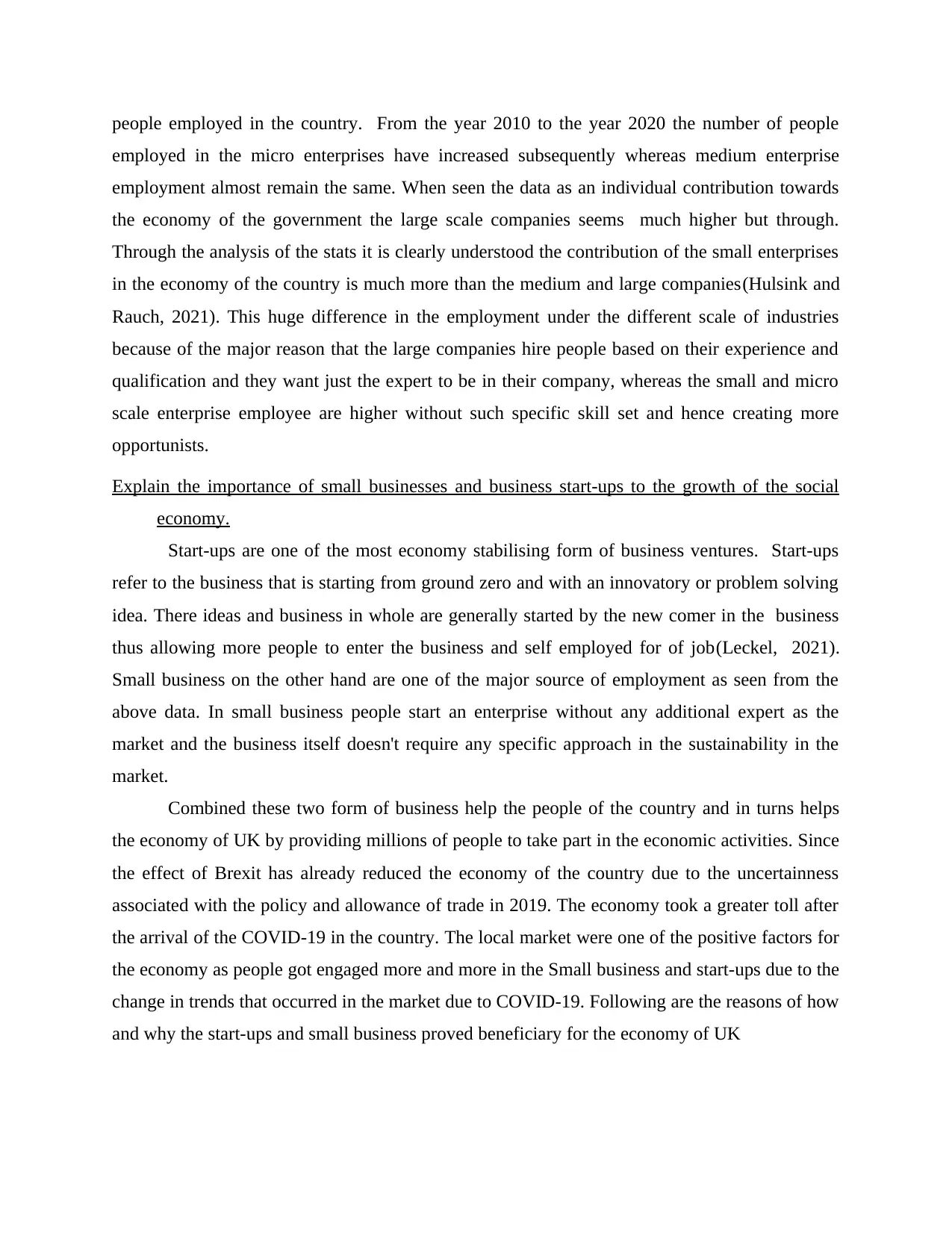
people employed in the country. From the year 2010 to the year 2020 the number of people
employed in the micro enterprises have increased subsequently whereas medium enterprise
employment almost remain the same. When seen the data as an individual contribution towards
the economy of the government the large scale companies seems much higher but through.
Through the analysis of the stats it is clearly understood the contribution of the small enterprises
in the economy of the country is much more than the medium and large companies(Hulsink and
Rauch, 2021). This huge difference in the employment under the different scale of industries
because of the major reason that the large companies hire people based on their experience and
qualification and they want just the expert to be in their company, whereas the small and micro
scale enterprise employee are higher without such specific skill set and hence creating more
opportunists.
Explain the importance of small businesses and business start-ups to the growth of the social
economy.
Start-ups are one of the most economy stabilising form of business ventures. Start-ups
refer to the business that is starting from ground zero and with an innovatory or problem solving
idea. There ideas and business in whole are generally started by the new comer in the business
thus allowing more people to enter the business and self employed for of job(Leckel, 2021).
Small business on the other hand are one of the major source of employment as seen from the
above data. In small business people start an enterprise without any additional expert as the
market and the business itself doesn't require any specific approach in the sustainability in the
market.
Combined these two form of business help the people of the country and in turns helps
the economy of UK by providing millions of people to take part in the economic activities. Since
the effect of Brexit has already reduced the economy of the country due to the uncertainness
associated with the policy and allowance of trade in 2019. The economy took a greater toll after
the arrival of the COVID-19 in the country. The local market were one of the positive factors for
the economy as people got engaged more and more in the Small business and start-ups due to the
change in trends that occurred in the market due to COVID-19. Following are the reasons of how
and why the start-ups and small business proved beneficiary for the economy of UK
employed in the micro enterprises have increased subsequently whereas medium enterprise
employment almost remain the same. When seen the data as an individual contribution towards
the economy of the government the large scale companies seems much higher but through.
Through the analysis of the stats it is clearly understood the contribution of the small enterprises
in the economy of the country is much more than the medium and large companies(Hulsink and
Rauch, 2021). This huge difference in the employment under the different scale of industries
because of the major reason that the large companies hire people based on their experience and
qualification and they want just the expert to be in their company, whereas the small and micro
scale enterprise employee are higher without such specific skill set and hence creating more
opportunists.
Explain the importance of small businesses and business start-ups to the growth of the social
economy.
Start-ups are one of the most economy stabilising form of business ventures. Start-ups
refer to the business that is starting from ground zero and with an innovatory or problem solving
idea. There ideas and business in whole are generally started by the new comer in the business
thus allowing more people to enter the business and self employed for of job(Leckel, 2021).
Small business on the other hand are one of the major source of employment as seen from the
above data. In small business people start an enterprise without any additional expert as the
market and the business itself doesn't require any specific approach in the sustainability in the
market.
Combined these two form of business help the people of the country and in turns helps
the economy of UK by providing millions of people to take part in the economic activities. Since
the effect of Brexit has already reduced the economy of the country due to the uncertainness
associated with the policy and allowance of trade in 2019. The economy took a greater toll after
the arrival of the COVID-19 in the country. The local market were one of the positive factors for
the economy as people got engaged more and more in the Small business and start-ups due to the
change in trends that occurred in the market due to COVID-19. Following are the reasons of how
and why the start-ups and small business proved beneficiary for the economy of UK
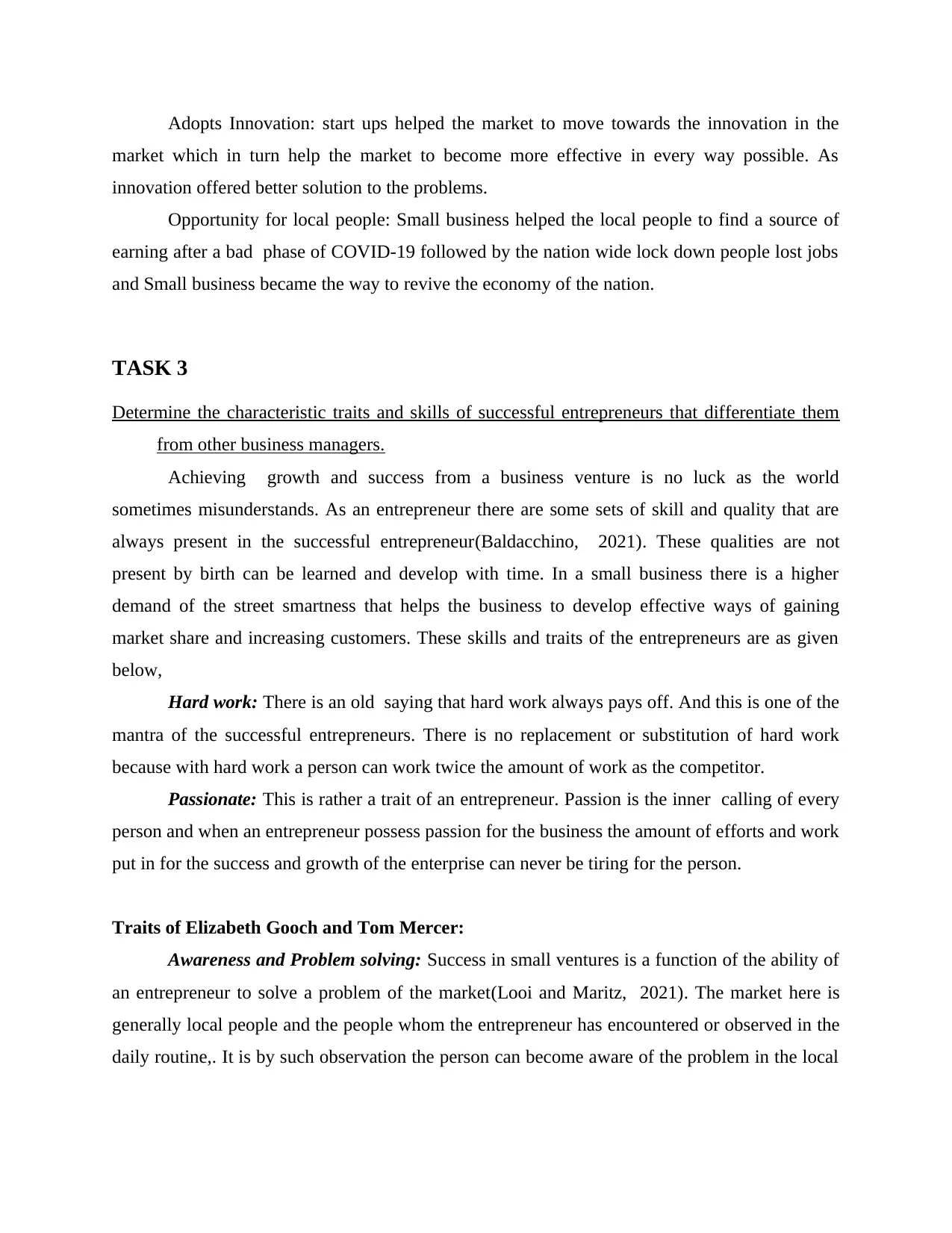
Adopts Innovation: start ups helped the market to move towards the innovation in the
market which in turn help the market to become more effective in every way possible. As
innovation offered better solution to the problems.
Opportunity for local people: Small business helped the local people to find a source of
earning after a bad phase of COVID-19 followed by the nation wide lock down people lost jobs
and Small business became the way to revive the economy of the nation.
TASK 3
Determine the characteristic traits and skills of successful entrepreneurs that differentiate them
from other business managers.
Achieving growth and success from a business venture is no luck as the world
sometimes misunderstands. As an entrepreneur there are some sets of skill and quality that are
always present in the successful entrepreneur(Baldacchino, 2021). These qualities are not
present by birth can be learned and develop with time. In a small business there is a higher
demand of the street smartness that helps the business to develop effective ways of gaining
market share and increasing customers. These skills and traits of the entrepreneurs are as given
below,
Hard work: There is an old saying that hard work always pays off. And this is one of the
mantra of the successful entrepreneurs. There is no replacement or substitution of hard work
because with hard work a person can work twice the amount of work as the competitor.
Passionate: This is rather a trait of an entrepreneur. Passion is the inner calling of every
person and when an entrepreneur possess passion for the business the amount of efforts and work
put in for the success and growth of the enterprise can never be tiring for the person.
Traits of Elizabeth Gooch and Tom Mercer:
Awareness and Problem solving: Success in small ventures is a function of the ability of
an entrepreneur to solve a problem of the market(Looi and Maritz, 2021). The market here is
generally local people and the people whom the entrepreneur has encountered or observed in the
daily routine,. It is by such observation the person can become aware of the problem in the local
market which in turn help the market to become more effective in every way possible. As
innovation offered better solution to the problems.
Opportunity for local people: Small business helped the local people to find a source of
earning after a bad phase of COVID-19 followed by the nation wide lock down people lost jobs
and Small business became the way to revive the economy of the nation.
TASK 3
Determine the characteristic traits and skills of successful entrepreneurs that differentiate them
from other business managers.
Achieving growth and success from a business venture is no luck as the world
sometimes misunderstands. As an entrepreneur there are some sets of skill and quality that are
always present in the successful entrepreneur(Baldacchino, 2021). These qualities are not
present by birth can be learned and develop with time. In a small business there is a higher
demand of the street smartness that helps the business to develop effective ways of gaining
market share and increasing customers. These skills and traits of the entrepreneurs are as given
below,
Hard work: There is an old saying that hard work always pays off. And this is one of the
mantra of the successful entrepreneurs. There is no replacement or substitution of hard work
because with hard work a person can work twice the amount of work as the competitor.
Passionate: This is rather a trait of an entrepreneur. Passion is the inner calling of every
person and when an entrepreneur possess passion for the business the amount of efforts and work
put in for the success and growth of the enterprise can never be tiring for the person.
Traits of Elizabeth Gooch and Tom Mercer:
Awareness and Problem solving: Success in small ventures is a function of the ability of
an entrepreneur to solve a problem of the market(Looi and Maritz, 2021). The market here is
generally local people and the people whom the entrepreneur has encountered or observed in the
daily routine,. It is by such observation the person can become aware of the problem in the local
⊘ This is a preview!⊘
Do you want full access?
Subscribe today to unlock all pages.

Trusted by 1+ million students worldwide
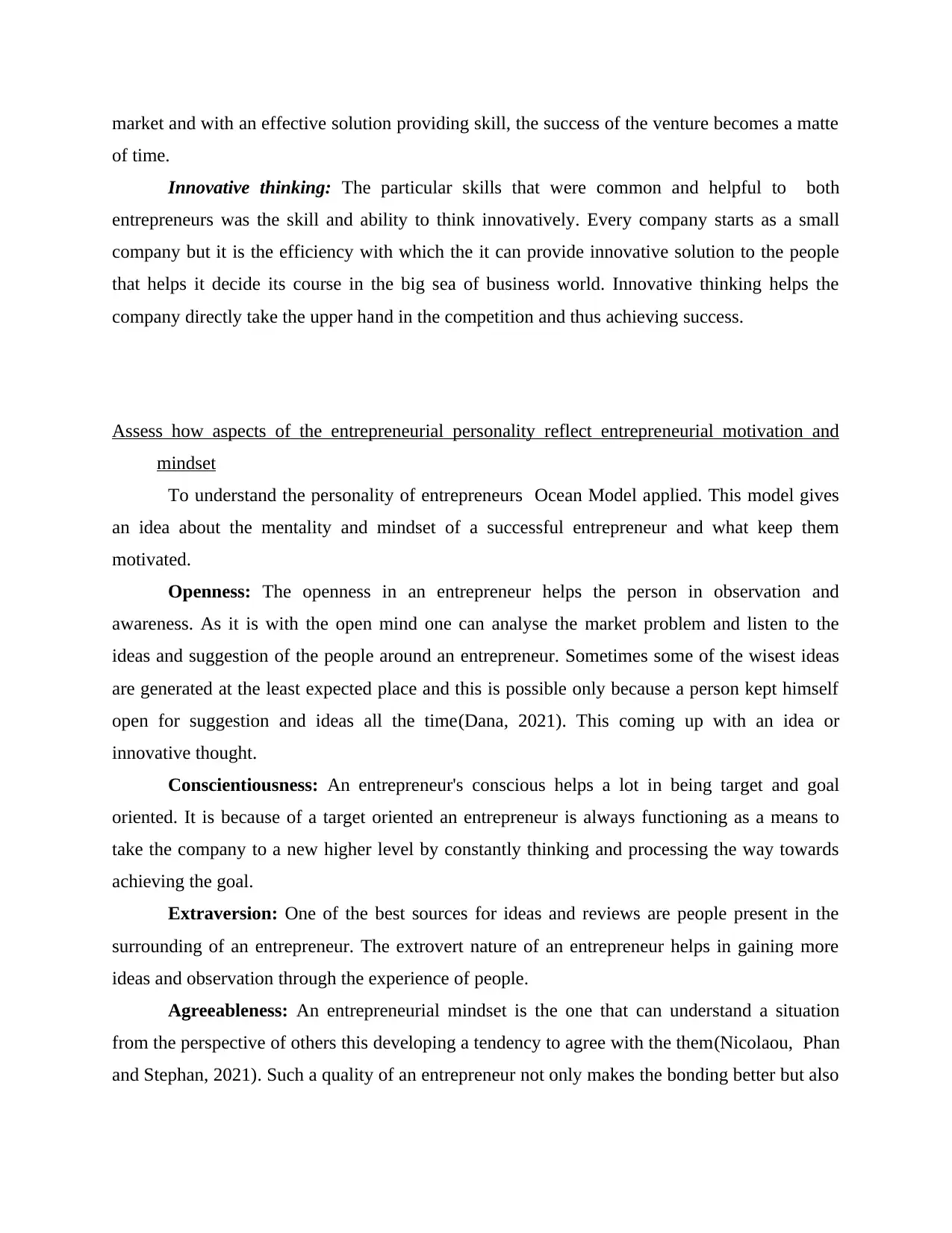
market and with an effective solution providing skill, the success of the venture becomes a matte
of time.
Innovative thinking: The particular skills that were common and helpful to both
entrepreneurs was the skill and ability to think innovatively. Every company starts as a small
company but it is the efficiency with which the it can provide innovative solution to the people
that helps it decide its course in the big sea of business world. Innovative thinking helps the
company directly take the upper hand in the competition and thus achieving success.
Assess how aspects of the entrepreneurial personality reflect entrepreneurial motivation and
mindset
To understand the personality of entrepreneurs Ocean Model applied. This model gives
an idea about the mentality and mindset of a successful entrepreneur and what keep them
motivated.
Openness: The openness in an entrepreneur helps the person in observation and
awareness. As it is with the open mind one can analyse the market problem and listen to the
ideas and suggestion of the people around an entrepreneur. Sometimes some of the wisest ideas
are generated at the least expected place and this is possible only because a person kept himself
open for suggestion and ideas all the time(Dana, 2021). This coming up with an idea or
innovative thought.
Conscientiousness: An entrepreneur's conscious helps a lot in being target and goal
oriented. It is because of a target oriented an entrepreneur is always functioning as a means to
take the company to a new higher level by constantly thinking and processing the way towards
achieving the goal.
Extraversion: One of the best sources for ideas and reviews are people present in the
surrounding of an entrepreneur. The extrovert nature of an entrepreneur helps in gaining more
ideas and observation through the experience of people.
Agreeableness: An entrepreneurial mindset is the one that can understand a situation
from the perspective of others this developing a tendency to agree with the them(Nicolaou, Phan
and Stephan, 2021). Such a quality of an entrepreneur not only makes the bonding better but also
of time.
Innovative thinking: The particular skills that were common and helpful to both
entrepreneurs was the skill and ability to think innovatively. Every company starts as a small
company but it is the efficiency with which the it can provide innovative solution to the people
that helps it decide its course in the big sea of business world. Innovative thinking helps the
company directly take the upper hand in the competition and thus achieving success.
Assess how aspects of the entrepreneurial personality reflect entrepreneurial motivation and
mindset
To understand the personality of entrepreneurs Ocean Model applied. This model gives
an idea about the mentality and mindset of a successful entrepreneur and what keep them
motivated.
Openness: The openness in an entrepreneur helps the person in observation and
awareness. As it is with the open mind one can analyse the market problem and listen to the
ideas and suggestion of the people around an entrepreneur. Sometimes some of the wisest ideas
are generated at the least expected place and this is possible only because a person kept himself
open for suggestion and ideas all the time(Dana, 2021). This coming up with an idea or
innovative thought.
Conscientiousness: An entrepreneur's conscious helps a lot in being target and goal
oriented. It is because of a target oriented an entrepreneur is always functioning as a means to
take the company to a new higher level by constantly thinking and processing the way towards
achieving the goal.
Extraversion: One of the best sources for ideas and reviews are people present in the
surrounding of an entrepreneur. The extrovert nature of an entrepreneur helps in gaining more
ideas and observation through the experience of people.
Agreeableness: An entrepreneurial mindset is the one that can understand a situation
from the perspective of others this developing a tendency to agree with the them(Nicolaou, Phan
and Stephan, 2021). Such a quality of an entrepreneur not only makes the bonding better but also
Paraphrase This Document
Need a fresh take? Get an instant paraphrase of this document with our AI Paraphraser
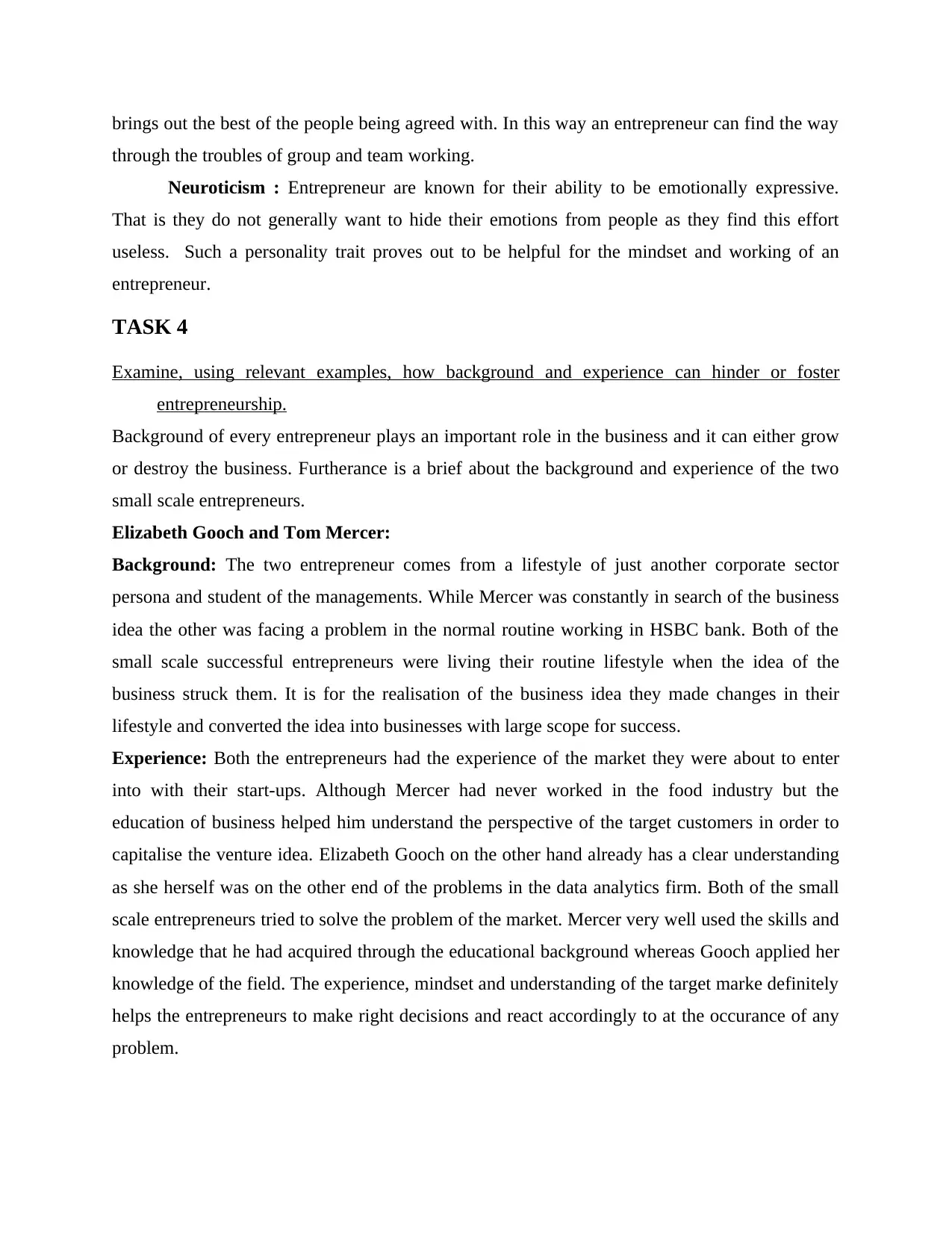
brings out the best of the people being agreed with. In this way an entrepreneur can find the way
through the troubles of group and team working.
Neuroticism : Entrepreneur are known for their ability to be emotionally expressive.
That is they do not generally want to hide their emotions from people as they find this effort
useless. Such a personality trait proves out to be helpful for the mindset and working of an
entrepreneur.
TASK 4
Examine, using relevant examples, how background and experience can hinder or foster
entrepreneurship.
Background of every entrepreneur plays an important role in the business and it can either grow
or destroy the business. Furtherance is a brief about the background and experience of the two
small scale entrepreneurs.
Elizabeth Gooch and Tom Mercer:
Background: The two entrepreneur comes from a lifestyle of just another corporate sector
persona and student of the managements. While Mercer was constantly in search of the business
idea the other was facing a problem in the normal routine working in HSBC bank. Both of the
small scale successful entrepreneurs were living their routine lifestyle when the idea of the
business struck them. It is for the realisation of the business idea they made changes in their
lifestyle and converted the idea into businesses with large scope for success.
Experience: Both the entrepreneurs had the experience of the market they were about to enter
into with their start-ups. Although Mercer had never worked in the food industry but the
education of business helped him understand the perspective of the target customers in order to
capitalise the venture idea. Elizabeth Gooch on the other hand already has a clear understanding
as she herself was on the other end of the problems in the data analytics firm. Both of the small
scale entrepreneurs tried to solve the problem of the market. Mercer very well used the skills and
knowledge that he had acquired through the educational background whereas Gooch applied her
knowledge of the field. The experience, mindset and understanding of the target marke definitely
helps the entrepreneurs to make right decisions and react accordingly to at the occurance of any
problem.
through the troubles of group and team working.
Neuroticism : Entrepreneur are known for their ability to be emotionally expressive.
That is they do not generally want to hide their emotions from people as they find this effort
useless. Such a personality trait proves out to be helpful for the mindset and working of an
entrepreneur.
TASK 4
Examine, using relevant examples, how background and experience can hinder or foster
entrepreneurship.
Background of every entrepreneur plays an important role in the business and it can either grow
or destroy the business. Furtherance is a brief about the background and experience of the two
small scale entrepreneurs.
Elizabeth Gooch and Tom Mercer:
Background: The two entrepreneur comes from a lifestyle of just another corporate sector
persona and student of the managements. While Mercer was constantly in search of the business
idea the other was facing a problem in the normal routine working in HSBC bank. Both of the
small scale successful entrepreneurs were living their routine lifestyle when the idea of the
business struck them. It is for the realisation of the business idea they made changes in their
lifestyle and converted the idea into businesses with large scope for success.
Experience: Both the entrepreneurs had the experience of the market they were about to enter
into with their start-ups. Although Mercer had never worked in the food industry but the
education of business helped him understand the perspective of the target customers in order to
capitalise the venture idea. Elizabeth Gooch on the other hand already has a clear understanding
as she herself was on the other end of the problems in the data analytics firm. Both of the small
scale entrepreneurs tried to solve the problem of the market. Mercer very well used the skills and
knowledge that he had acquired through the educational background whereas Gooch applied her
knowledge of the field. The experience, mindset and understanding of the target marke definitely
helps the entrepreneurs to make right decisions and react accordingly to at the occurance of any
problem.
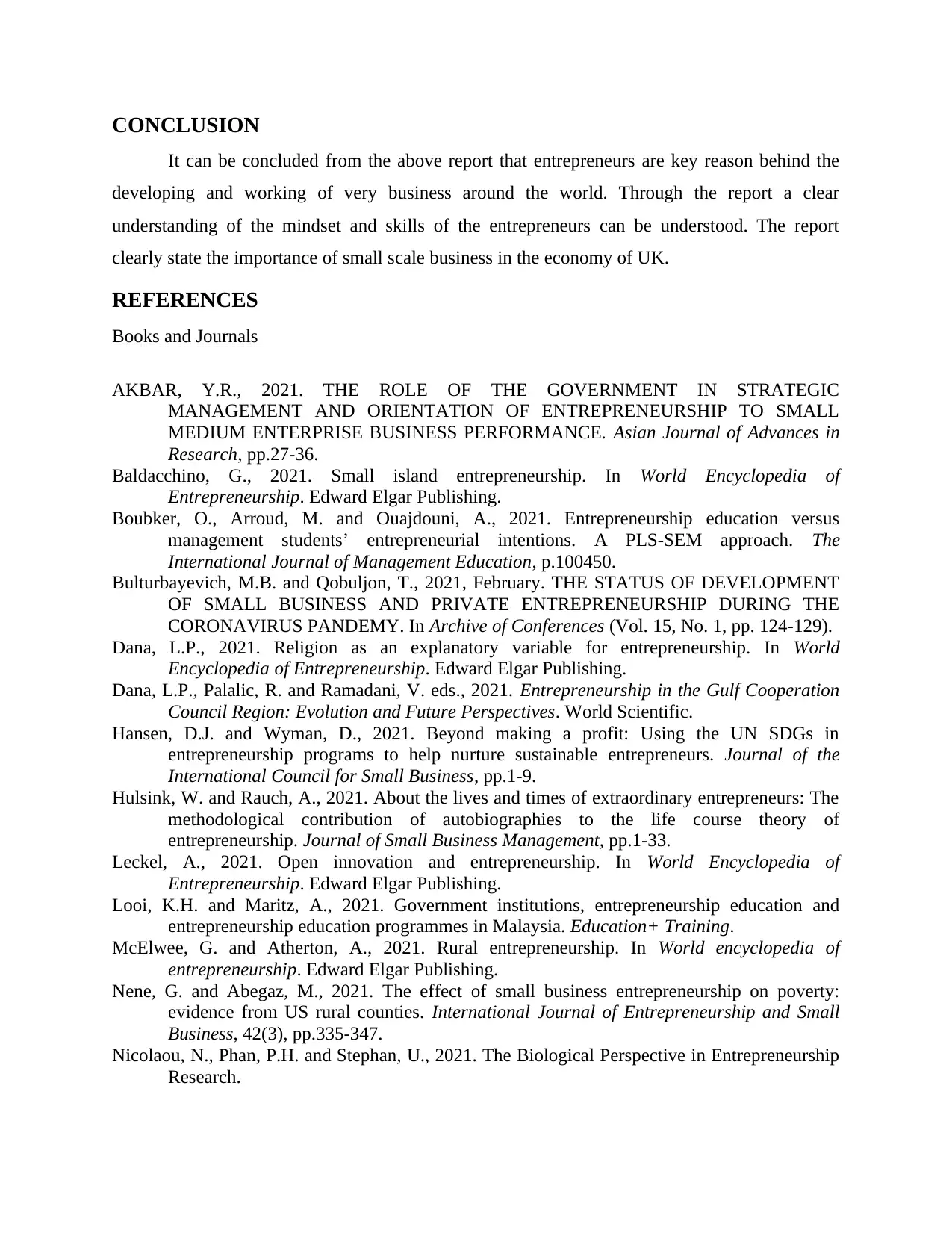
CONCLUSION
It can be concluded from the above report that entrepreneurs are key reason behind the
developing and working of very business around the world. Through the report a clear
understanding of the mindset and skills of the entrepreneurs can be understood. The report
clearly state the importance of small scale business in the economy of UK.
REFERENCES
Books and Journals
AKBAR, Y.R., 2021. THE ROLE OF THE GOVERNMENT IN STRATEGIC
MANAGEMENT AND ORIENTATION OF ENTREPRENEURSHIP TO SMALL
MEDIUM ENTERPRISE BUSINESS PERFORMANCE. Asian Journal of Advances in
Research, pp.27-36.
Baldacchino, G., 2021. Small island entrepreneurship. In World Encyclopedia of
Entrepreneurship. Edward Elgar Publishing.
Boubker, O., Arroud, M. and Ouajdouni, A., 2021. Entrepreneurship education versus
management students’ entrepreneurial intentions. A PLS-SEM approach. The
International Journal of Management Education, p.100450.
Bulturbayevich, M.B. and Qobuljon, T., 2021, February. THE STATUS OF DEVELOPMENT
OF SMALL BUSINESS AND PRIVATE ENTREPRENEURSHIP DURING THE
CORONAVIRUS PANDEMY. In Archive of Conferences (Vol. 15, No. 1, pp. 124-129).
Dana, L.P., 2021. Religion as an explanatory variable for entrepreneurship. In World
Encyclopedia of Entrepreneurship. Edward Elgar Publishing.
Dana, L.P., Palalic, R. and Ramadani, V. eds., 2021. Entrepreneurship in the Gulf Cooperation
Council Region: Evolution and Future Perspectives. World Scientific.
Hansen, D.J. and Wyman, D., 2021. Beyond making a profit: Using the UN SDGs in
entrepreneurship programs to help nurture sustainable entrepreneurs. Journal of the
International Council for Small Business, pp.1-9.
Hulsink, W. and Rauch, A., 2021. About the lives and times of extraordinary entrepreneurs: The
methodological contribution of autobiographies to the life course theory of
entrepreneurship. Journal of Small Business Management, pp.1-33.
Leckel, A., 2021. Open innovation and entrepreneurship. In World Encyclopedia of
Entrepreneurship. Edward Elgar Publishing.
Looi, K.H. and Maritz, A., 2021. Government institutions, entrepreneurship education and
entrepreneurship education programmes in Malaysia. Education+ Training.
McElwee, G. and Atherton, A., 2021. Rural entrepreneurship. In World encyclopedia of
entrepreneurship. Edward Elgar Publishing.
Nene, G. and Abegaz, M., 2021. The effect of small business entrepreneurship on poverty:
evidence from US rural counties. International Journal of Entrepreneurship and Small
Business, 42(3), pp.335-347.
Nicolaou, N., Phan, P.H. and Stephan, U., 2021. The Biological Perspective in Entrepreneurship
Research.
It can be concluded from the above report that entrepreneurs are key reason behind the
developing and working of very business around the world. Through the report a clear
understanding of the mindset and skills of the entrepreneurs can be understood. The report
clearly state the importance of small scale business in the economy of UK.
REFERENCES
Books and Journals
AKBAR, Y.R., 2021. THE ROLE OF THE GOVERNMENT IN STRATEGIC
MANAGEMENT AND ORIENTATION OF ENTREPRENEURSHIP TO SMALL
MEDIUM ENTERPRISE BUSINESS PERFORMANCE. Asian Journal of Advances in
Research, pp.27-36.
Baldacchino, G., 2021. Small island entrepreneurship. In World Encyclopedia of
Entrepreneurship. Edward Elgar Publishing.
Boubker, O., Arroud, M. and Ouajdouni, A., 2021. Entrepreneurship education versus
management students’ entrepreneurial intentions. A PLS-SEM approach. The
International Journal of Management Education, p.100450.
Bulturbayevich, M.B. and Qobuljon, T., 2021, February. THE STATUS OF DEVELOPMENT
OF SMALL BUSINESS AND PRIVATE ENTREPRENEURSHIP DURING THE
CORONAVIRUS PANDEMY. In Archive of Conferences (Vol. 15, No. 1, pp. 124-129).
Dana, L.P., 2021. Religion as an explanatory variable for entrepreneurship. In World
Encyclopedia of Entrepreneurship. Edward Elgar Publishing.
Dana, L.P., Palalic, R. and Ramadani, V. eds., 2021. Entrepreneurship in the Gulf Cooperation
Council Region: Evolution and Future Perspectives. World Scientific.
Hansen, D.J. and Wyman, D., 2021. Beyond making a profit: Using the UN SDGs in
entrepreneurship programs to help nurture sustainable entrepreneurs. Journal of the
International Council for Small Business, pp.1-9.
Hulsink, W. and Rauch, A., 2021. About the lives and times of extraordinary entrepreneurs: The
methodological contribution of autobiographies to the life course theory of
entrepreneurship. Journal of Small Business Management, pp.1-33.
Leckel, A., 2021. Open innovation and entrepreneurship. In World Encyclopedia of
Entrepreneurship. Edward Elgar Publishing.
Looi, K.H. and Maritz, A., 2021. Government institutions, entrepreneurship education and
entrepreneurship education programmes in Malaysia. Education+ Training.
McElwee, G. and Atherton, A., 2021. Rural entrepreneurship. In World encyclopedia of
entrepreneurship. Edward Elgar Publishing.
Nene, G. and Abegaz, M., 2021. The effect of small business entrepreneurship on poverty:
evidence from US rural counties. International Journal of Entrepreneurship and Small
Business, 42(3), pp.335-347.
Nicolaou, N., Phan, P.H. and Stephan, U., 2021. The Biological Perspective in Entrepreneurship
Research.
⊘ This is a preview!⊘
Do you want full access?
Subscribe today to unlock all pages.

Trusted by 1+ million students worldwide
1 out of 14
Related Documents
Your All-in-One AI-Powered Toolkit for Academic Success.
+13062052269
info@desklib.com
Available 24*7 on WhatsApp / Email
![[object Object]](/_next/static/media/star-bottom.7253800d.svg)
Unlock your academic potential
Copyright © 2020–2026 A2Z Services. All Rights Reserved. Developed and managed by ZUCOL.





![Entrepreneurship and Small Business Impact Report - [University Name]](/_next/image/?url=https%3A%2F%2Fdesklib.com%2Fmedia%2Fimages%2Fwj%2Fd1f42599211847658d3fd556aa563fa5.jpg&w=256&q=75)